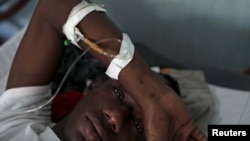The World Health Organization says cholera vaccines are effectively controlling the spread of the deadly disease in a number of high-risk areas around the globe, but the lack of vaccines limits the ability to protect all people in need.
According to newly released data by the U.N. agency, there are an estimated three to five million cases of cholera annually, which can cause up to 120,000 deaths worldwide. The virulent illness, which can kill in a matter of hours, is caused by ingestion of contaminated food or water and thrives in unsanitary conditions.
An oral cholera vaccine has been around since 1991, but has been given mainly to travelers, but funding from international agencies has allowed WHO officials to dip into stockpile of two million doses of the vaccine for use in high-risk places.
WHO cholera expert Dominique Legros says the vaccine is proving to be an efficient tool to control outbreaks effectively, and that he expects increased production of the vaccine in coming years, with up to three million doses available for use in endemic hotspots and emergency situations.
Despite increased access to vaccines, however, improved sanitation, particularly in developing countries, is key.
“The long-term solution for cholera, [we've known for] 150 years, is development. It is access to safe water, access to sanitation," he said. "But really, it works as sort of key to the door. It shows that something can be done. That impact can be achieved very quickly with the vaccine and then we can take ... a follow-up with water and sanitation intervention.”
Cholera can occur at any time during the year, and the WHO says about 40 million people are at risk of infection in Africa, where hot spots include the eastern Democratic Republic of Congo, Burundi and Tanzania, South Sudan, Mozambique and fishing communities in Ghana.
Another main focus is around Lake Chad, including unstable areas of Chad, Cameroon, Niger and Nigeria. Legros tells VOA aid workers are vaccinating people against cholera in South Sudan, particularly in Unity State and north Juba, the capital. Plans to vaccinate in Malakal in Upper Nile State had to be abandoned because of insecurity, he said.
“We make sure that we allocate the vaccine according to the risk, where the risk is the highest and where the capacity to implement the campaign is also possible," he said. "If you send vaccines and then the campaign cannot be performed because of security issues, for example, it is not a very good idea.”
As of July 4, the WHO had received reports of 632 cholera cases including 30 deaths from 75 villages in Juba County. Officials says more than 17,800 cases of cholera, including 150 deaths, have occurred this year in Tanzania.




